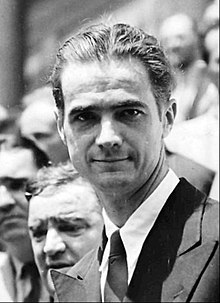Howard R. Hughes, Jr.
| Howard Hughes | |
|---|---|

Howard Hughes in February 1938
|
|
| Born |
Howard Robard Hughes Jr. September 24, 1905 Humble, Texas, U.S. |
| Died | April 5, 1976 (aged 70) en route to Houston, Texas, U.S. |
| Cause of death | Kidney failure |
| Resting place | Glenwood Cemetery, Houston, Texas |
| Residence | Houston, Texas |
| Nationality | United States |
| Education | Thacher School, Fessenden School |
| Alma mater |
California Institute of Technology Rice University (dropped out in 1924) |
| Occupation | Chairman and CEO of Summa Corporation Founder of The Howard Hughes Corporation Founder of the Hughes Aircraft Company Founder and benefactor of the Howard Hughes Medical Institute Owner of Hughes Airwest Airlines |
| Years active | 1926–76 |
| Home town | Houston, Texas |
| Net worth | $1.5 billion (equivalent to $6.31 billion in today's dollars). at the time of his death (approximately 1/1190th of U.S. GNP) |
| Board member of |
Hughes Aircraft Company, Howard Hughes Medical Institute |
| Spouse(s) |
Ella Botts Rice (m. 1925; div. 1929) Jean Peters (m. 1957; div. 1971) |
| Parent(s) |
Howard R. Hughes Sr. Allene Stone Gano |
| Aviation career | |
| Known for | Hughes Aircraft Company; Films. |
| Famous flights | Hughes H-4 Hercules (Spruce Goose), Transcontinental airspeed record from Los Angeles to Newark NJ (1937), round the world airspeed record (1938) |
| Awards |
Harmon Trophy (1936 and 1938) Collier Trophy (1938) Congressional Gold Medal (1939) Octave Chanute Award (1940) National Aviation Hall of Fame (1973) |
| Signature | |
Howard Robard Hughes Jr. (September 24, 1905 – April 5, 1976) was an American business magnate, investor, record-setting pilot, film director, and philanthropist, known during his lifetime as one of the most financially successful individuals in the world. He first made a name for himself as a film producer, and then became an influential figure in the aviation industry. Later in life, he became known for his eccentric behavior and reclusive lifestyle—oddities that were caused in part by a worsening obsessive–compulsive disorder (OCD), chronic pain from several plane crashes, and increasing deafness.
As a maverick film tycoon, Hughes gained prominence in Hollywood beginning in the late 1920s, when he produced big-budget and often controversial films like The Racket (1928),Hell's Angels (1930), and Scarface (1932). Later he controlled the RKO film studio.
Hughes formed the Hughes Aircraft Company in 1932, hiring numerous engineers and designers. He spent the rest of the 1930s and much of the 1940s setting multiple world air speed records and building the Hughes H-1 Racer and H-4 Hercules (the Spruce Goose). He acquired and expanded Trans World Airlines and later acquired Air West, renaming it Hughes Airwest. Hughes was included in Flying Magazine's list of the 51 Heroes of Aviation, ranked at No. 25. Today, his legacy is maintained through the Howard Hughes Medical Institute and the Howard Hughes Corporation.
...
Wikipedia
